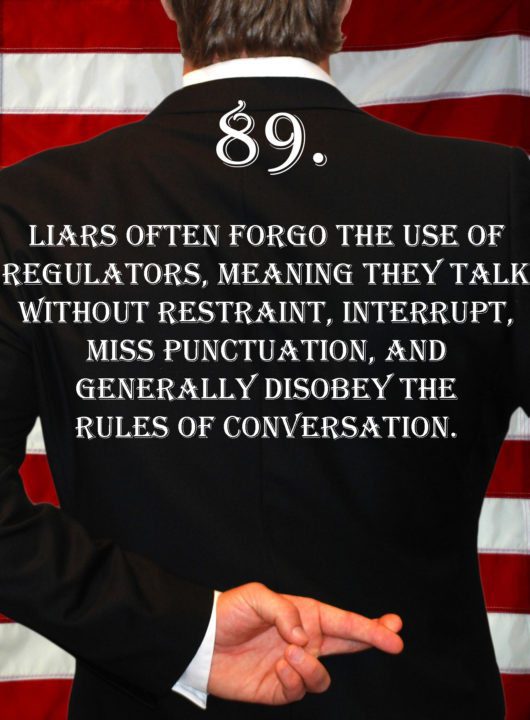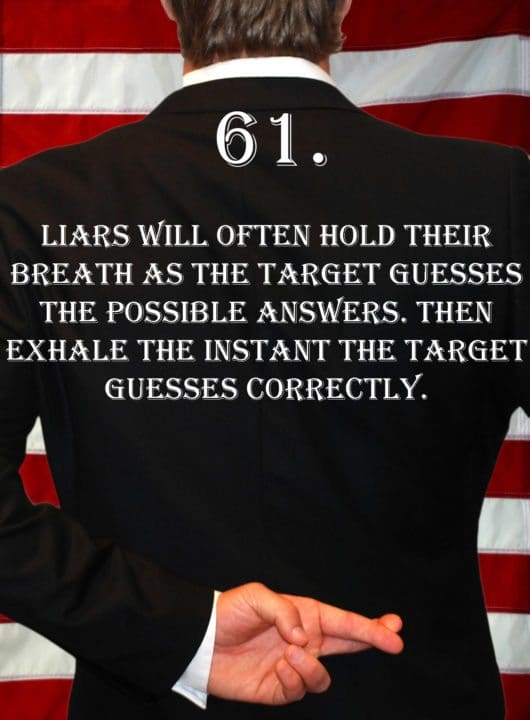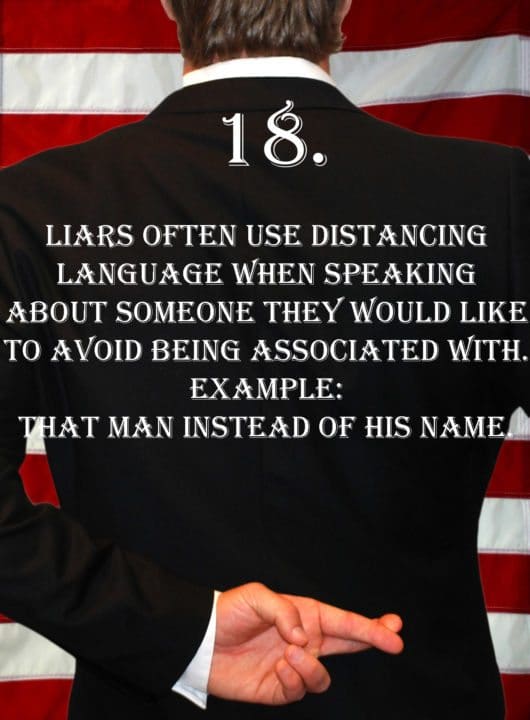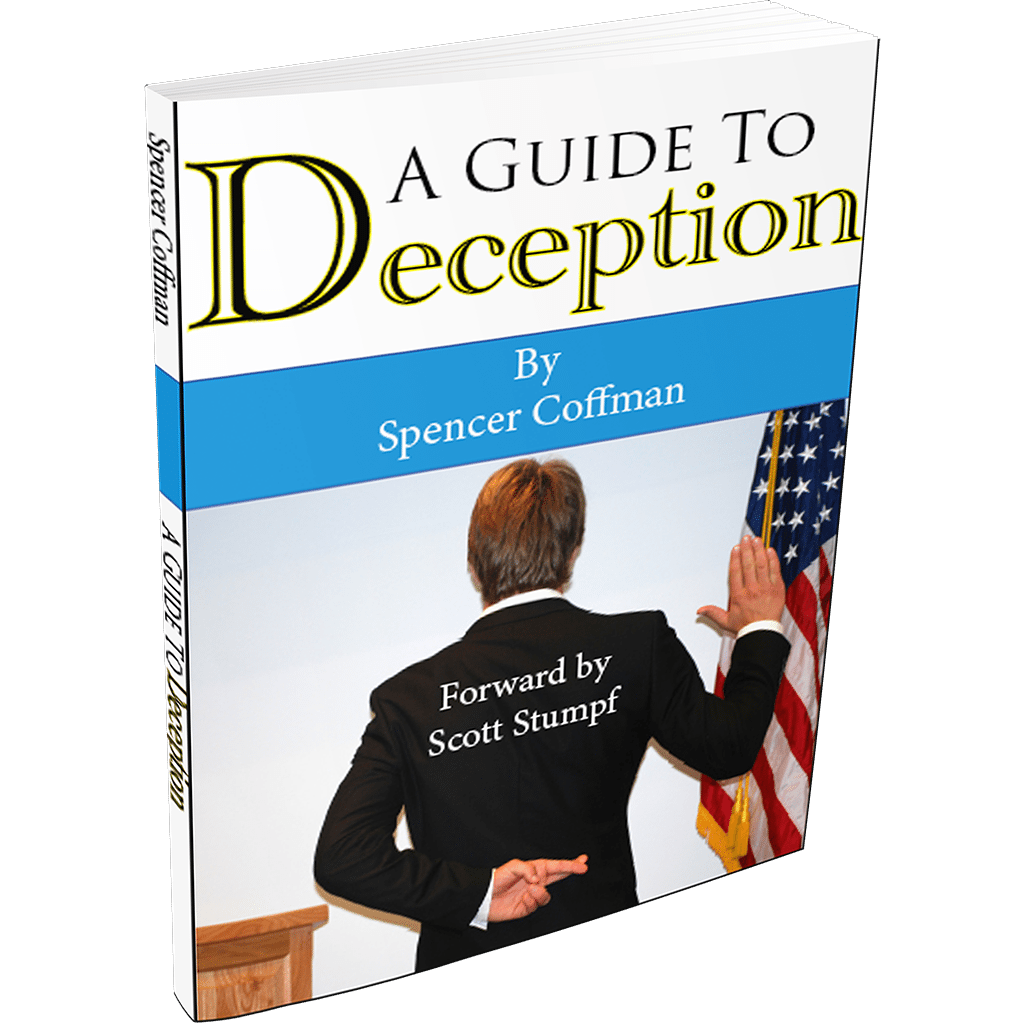
Deception Tip 89:
Liars often forgo the use of regulators, meaning they talk without restraint, interrupt, miss punctuation, and generally disobey the rules of conversation.
Listen To The Podcast!
E89 – Forgo Regulators – Deception Tips Podcast – Click Here To Subscribe
Podcast Transcript
Hello and welcome to the Deception Tips podcast where you will learn amazing cues to detect deceit that will help you read people like never before. I’m your host Spencer Coffman, let’s get started.
Hello and welcome to episode 89 of the Deception Tips podcast. Last week, we spoke about whether or not it really matters if you call out every lie you see.
It’s related to the episode prior to that, so two weeks ago, hopefully, you’ve listened to both of them. If not, I encourage you to do so, you may even want to listen to them a couple of times.
They were a couple of very important episodes relating to this entire project on reading people, detecting deception, and spotting lies. They are kind of the moral compass behind everything in deception detection.
Whether or not you should call out people when they lie and when you should call out certain lies is a very important thing to know as you begin to understand body language and start to spotlight a lot more often.
As I’ve mentioned too, this is episode number 89, so you’ve listened to, hopefully, 88 previous deception tips. That’s a lot of learning that you have done, not to mention any other learning you have done on your own or any of the other materials of mine that you have taken advantage of. I’ve got a lot of free stuff out there for you guys to continue to learn more about reading people and detecting deception.
So, you’ve done a lot, you have a lot of information and what you choose to do with that information is up to you. This can be a new and enlightening thing, you’re starting to see a lot of things that you didn’t see before, and you’re realizing the truth. Whether or not you point that truth out and embarrass someone or whether you point it out and help someone is entirely up to you.
So, is it important to call out every single lie? That is up to you but our conclusion last week or my conclusion last week was that small, white lies are low stake lies, they are social polite, those types of things.
They don’t need to be called out in front of everyone but if you want to go speak to that person privately and ask them what’s going on, you can feel free to do that.
In addition, when you call out those lies, do so lovingly, caringly for other people. On the other hand, high stake lies, should you call them out every time? Again, depends on the situation. If there’s a matter of life and death, in which a lot of high stake lies can ruin careers or people will end up dead, you may want to be carefully considering what you want to do in that situation.
However, if people are lying to cover up things or they’re a suspect in an investigation and you spot those lies, well, obviously, people are trying to find the truth.
Therefore, if you can see those lies then you should help reveal the truth in that situation. Again, it’s up to you what you do with that information but hopefully, no matter what you do, you do it with thought and with care.
Today, we have another tip, this is a general tip when people are lying, about how they speak. We’ve talked a lot about speech over the past episodes, over the months and years about different things in speech when people lie. How they talk, we’ve done a lot of episodes on the word choice that they use, things like how you can start sentences and get them to talk.
That’s on your part, that was episode 82. We have the relating language, you can relate to them a little bit more and get them to relate to you, that was episode 84. We also had even longer ago, we’ve done a lot of different episodes on how people speak, Unconventional Language, they don’t use normal words, that’s episode 31.
I’m only going to name a few of them because there were quite a few. Distancing Language, that liars love to distance themselves from the situation or the event, that was episode 18. Detailed Stories, episode 17, where they go into a lot more detail in their lie because they want you to believe that they knew exactly what was going on.
Other things like Repeating the Question or saying the question again or having people repeat the question or ask for it to be repeated, episode 43. You get the whole idea, there are quite a few of them in speech patterns and how people speak. So, today we have, as I said, a general overview of the entire speech pattern or several little tips.
This could really be broken up into several tips but they’re all in one because they all relate to each other. As I said, we’ve had a lot of speech stuff, so you should have a pretty good idea of it.
Again, all of these will be organized into a playlist on the Body Language YouTube channel where you can check out specifically related to speech. So, if you don’t remember all those that I just said or you don’t want to rewind it, you can check them out there.
So, here it is, Deception Tip number 89. Liars often forego the use of regulators, meaning they talk without restraint, interrupt, miss punctuation, and generally disobeyed the rules of conversation.
Here it is again, Deception Tip number 89. Liars often forego the use of regulators, meaning they talk without restraint, interrupt, miss punctuation, and generally disobeyed the rules of conversation.
So, what does that mean? That’s a lot of stuff there. As I said, it could be several tips in one, so the first thing that needs to get explained is the use of regulators. Well, what is that? What are regulators? Regulators are a part of the conversation, they are the things that put conversation together. The little periods, commas, semi-colons, introductory statements, suffixes, prefixes, and ending statements.
How you raise your voice at the end of a question, different things that put it all together. Grammar and syntax are a part of the regulators. If you take a look at my blog, I’ve got a whole bunch of different articles on language use and structure. You could check all that out to learn a lot more about this whole regulator language, structures, speech, etc.
We’re not talking about that here, I encourage you to check it out though because it will really help you, regulators are the rules of conversation. If you continue on with the tip, meaning they talk without restraint, interrupt, miss punctuation, and generally disobey rules of conversation.
That is what we’re talking about today, I’m going to break down each of these. As I said, they could be several different tips without restraint, interrupting, missing punctuation, etc. We’re going to break all those down, go into some detail and bring in a few more coming up right after this.
Spencer Coffman has been studying body language since 2010. He is certified at the expert level in subtle expression and micro-expression training. Download his books on spencercoffman.com.
Welcome back to Deception Tip episode number 89, where we are talking about the use of regulators in conversation. Why are we talking about this? Well, it is because liars often forego the use of regulators, which means they don’t use them. So, their speech and their conversation could be all jumbled up, it could be all piled together, and it could be really rapid.
You may not know, well, wait a minute, are they pausing there or is there a comma supposed to be here? It’s crazy. If you ever had a class in English and your teacher was one who was an outside-the-box thinker and they wanted to introduce a little bit of a conflict and diversity in the classroom. They, no doubt, have put a few different sentence options on the board without any commas or punctuation.
Then they may be placed with commas and punctuation to get the sentence to mean something different. A popular one is ‘a woman without her man is lost’. Okay, so it could be read a few different ways, ‘a woman without her man, is lost’. So, like a woman needs the man or it could be, ‘a woman, without her, man is lost’. So, it could be two different ways, it’s the same sentence but it could have two different meanings depending on where you place the punctuation.
I’ll say it one more time just so you get the idea, ‘a woman without her man, is lost, ‘a woman, without her, man is lost’. So, two different meetings there and there are other sentences like that. Again, if you were in a class, you maybe have a ton of different options or you remember some different ideas but those commas were interrupters, they were important to the meaning of that sentence.
So, if a liar is speaking without interrupters, you may not know what they mean by a certain sentence. A woman without her man is lost, blah, blah, blah, blah, blah.
Well, wait a minute, what are you meaning by that? Where are those commas and punctuation? Where are they supposed to be? In addition, they will often, as I said, talk without restraint, that would just be seamlessly one thing to the next, on and on and on.
Sometimes that could be a psychological disorder or it’s a person’s personality traits but usually, you will be able to tell the difference because you’ll know the baseline behavior of that individual. Developing a baseline is very important so you know what to compare their current behavior to. You have a base of comparison, it’s the baseline, we’ve talked about this before.
Also, they interrupt, liars will interrupt. Why? Well, because they are dying to get that story out, they want their lie to be told, they want it to be believed, and they need to get it off their chest.
Remember there is an enormous amount of stress and tension inside of them, it’s boiling up. Practically a third of the tips we’ve talked about have to deal with expressing or relieving the stress and tension in the body when they are lying.
They have a battle, the unconscious and the conscious are fighting like mad, the conscious wants that lie to get out, and the unconscious wants the truth to get out.
Therefore, they will interrupt you when you’re speaking to push that lie out, they want you to believe. If it seems like you’re starting to not believe it, boom, they’re going to start talking again to try to convince you of this lie.
They are going to be the best salesman they can be in order to get you to believe that lie. In addition, they’re also trying to get themselves to believe the lie, so they not only need to sell you but they need to sell themselves and everybody else in the room, therefore, they want to talk.
Miss punctuation, we spoke about this a little bit when I gave you the example of the sentences, they will definitely miss punctuation. For example, when you hear people reading, this is when people are learning how to read, like in grade school, you have to teach them. No, no, when you get to a comma you have to pause, also, when you get to a period, you need to stop.
You cannot just keep reading sentence after sentence because those listening need to understand the meaning and the context of whatever it is being read. You’ll notice that a lot of new readers or people who are long-time readers but they’re not very good at reading, they will read, as they get to commas or periods, they may just keep reading.
They may also pause in different spots in the sentences without periods or commas, like when they get to the end of a line or when they need to take a breath. You say, yeah, but people need to breathe. Yes, that’s why there are periods and commas in punctuation so that people can breathe when they’re reading. They don’t need to simply pause whenever they want.
They can pause and breathe when the periods and commas come up in sentences, and use them to their advantage. Experienced readers, like when you hear people reading audiobooks or you hear people reading at book reading events or on TV or reading rainbow. People who are experienced readers, they put all of that into effect when they’re reading that book so that you get the best picture of what’s going on.
They pause at the commas, they stop at the periods, they breathe during those times, that way everything else is flowing. People who are lying, they’re not going to do that, they’re going to be talking, they’re going to miss their punctuation.
Their questions are going to sound like statements, you’re not going to know what’s going on. You’re going to need to clarify all of that because they are not thinking about the rules of conversation.
They’re not thinking about getting their message across clearly, they are only thinking about getting their message across and getting people to believe it, that’s it. Now, if they’ve rehearsed this lie over and over again, they may have appropriate pauses and periods and breaths, etc.
Remember we have tips against that such as getting them to recite the story backward because if they do that, they’ve rehearsed it only forward. Just like if I ask you to say the alphabet backward unless you’ve practiced, you’re really not going to know how to do that. You may get a few letters but you’re not going to get a lot of them.
So, that is something too, there are ways around everything, you can’t really call out every lie but you can have a strategy to find out whether or not people are lying when you ask them to use these different tactics.
Different things that we know about and that you have learned about over the course of the Deception Tips podcast, reading, videos, etc. Remember that liars often forego the use of regulators, their speech habits and stories may not be exactly normal.
I want to thank you for listening to this week’s episode of the Deception Tips podcast. I hope that you’ll share it with your friends, subscribe to the feed, check out the Deception Tips videos, the blog and take a look at the books I have available, and, as always, tune in next week for a new deception tip.
Video Transcript
Hey guys, my name is Spencer Coffman, thank you for watching the deception tips videos. They’re all about teaching you how to read people and detect deception so that you will be able to tell if someone is lying to you. Today we’re going to talk about a cool tip that is related to speech and voice. It is something that people do when they’re lying, it’s a way of speech, it’s a speech pattern that they display.
It’s really something that you need to pay attention to, it’s something you may have heard a lot and you don’t know what it is. Now that we’ll point it out and you’ll be aware of it, you’re going to recognize it a lot more when you are engaging in everyday conversations. So, here it is, this is Deception Tip number 89. Liars often forego the use of regulators, meaning they talk without restraint, interrupt, miss punctuation, and generally disobey the rules of conversation.
There is a lot in this tip but it’s really simple, basically, they skip regulators. Regulators are the things in conversation that dictate how we converse, it’s how we understand things such as rising at the end of a question or pausing where a comma is, stopping at a period, things like that. It’s allowing other people to speak when they seem to take a breath when you’re in conversation rather than talking over them.
Certain little elements basically, its social courtesy is what regulators are. So, they often don’t care about those, they disregard them, they forget them. The reason that they do that isn’t because they’re being rude, they are being rude but they’re not intentionally being rude during this. They’ve got so much going on in their minds, remember when they’re lying, they’re under stress and tension, anxiety and all they can think about is getting this lie out.
So, when they’re trying to tell this, they simply just let it go and pausing, breathing, interrupting people, all of those social rules of conversation just go right out the window. They miss punctuation, like in the intro when I say, my name is Spencer Coffman then I pause. If I was telling a lie and my name was something else, hey guys, my name is Spencer Coffman, thank you very much, I would just keep going and there’s no pausing.
You hear this a lot when people are talking and they’re really excited, so keep in mind it may not be that they are lying. It could simply be that the person is really excited about whatever you’re telling them, whatever they’re telling you or whatever they have to say. Excitement often can take the place of some of that, so you may think that oh man, they might be lying because they seem to be stuttering.
Maybe they’re missing periods, punctuations, commas, maybe when they’re asking a question, they’re saying it like a statement. Instead of a period, it seems like they’re talking with an exclamation point and you may say wow, it could be they’re lying. It also could be that they’re nervous because sometimes you may have heard that nervousness may sound like excitement.
For example, if you call someone up on the phone and you’re really nervous about whatever you’re saying, you may sound excited to them. So, nervousness and excitement can sound a lot alike, therefore, if you’re nervous about something and talking, don’t worry because you could just sound excited.
That could be something that doesn’t really even matter when you are speaking or when they’re talking. So, keep that in mind when you’re in conversation sometimes when people are talking it could be excitement, it could be nervousness or it could be the fact that they are foregoing the regulators in conversation and are indeed lying.
So, if this is your first time watching these videos, I’d love to have you subscribe to the channel on YouTube. Feel free to comment with any questions you may have as well. Also, if you’d like some more information, we have books, podcasts, and blog posts all available on spencercoffman.com that are dedicated to teaching you exactly what every body is really saying.
Until next time.






